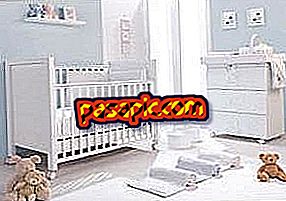How to clean my dog's anal glands

The glands that are on the sides of the anus of the dogs, also known as anal sacs, serve to lubricate the rectum so that they can relieve themselves without problems, although they also have other secondary functions. If we do not take care of this part of the body of our pet, in a short time we will see that it presents malaise and begin to arise problems such as abscesses, infections, fistulas and we will notice an unpleasant odor. From there, if they are not cleaned can be major complications in the health of our dog.
So, even if they work well on their own, we must make sure they do not get clogged or infected. For this, it is necessary to know how to clean my dog's anal glands, since emptying them is the best way to control and avoid possible problems. For this reason, in this article we are going to tell you everything you need to know about this aspect of your pet's care.
What are the anal glands
These glands are located on both sides of the anus of our pets, both in dogs and cats, specifically and comparing it with a watch we can say that they are placed at 4 and at 8, that is, slightly below half. Their size may vary a bit depending on the size of the animal but, generally, they are about 1 cm in diameter, comparable to a chickpea or a marble.
More commonly known as anal sacs, these glands have the function of storing the substance or lubricating liquid that they produce so that, through a conduit that connects them directly with the end of the rectum or the anus, they lubricate the feces so that the animal can evacuate better your bowel movements. In normal state of health of the dog this substance is liquid, smelly and of a yellowish or brown tone.
The smell of this liquid is very strong and unpleasant for us, but not only serve to facilitate the deposition of feces and prevent damage to this part of the body, but also give a specific smell to each dog. For this reason, for them it is their identity or personal brand and they recognize each other mainly thanks to it. Thus, when we see that two dogs are found and sniff the back of each other is because they are knowing and identifying.

What happens if the anal glands are not emptied
Normally, dogs empty these glands when defecating and there is a balance between production and emptying, but it may happen that they have problems to achieve it due to health conditions, type of feeding, pregnancy or old age.
Therefore, sometimes, there may be an excess of production and storage of this liquid and we can find spots at home and notice the characteristic and strong smell of this substance. This is a clear sign that our dog needs us to help him clean or empty the sacks to avoid generating health problems. Even so, that there are no stains does not mean that there is not an excessive accumulation, therefore, it must be prevented and cleaned every so often.
If we do not realize that this happens, if we leave it untreated, if we never clean it by prevention or there is an infection or other conditions in this area, then this substance thickens and causes the anal sacs to become clogged . When this happens the animals suffer from pain, itching, burning, discomfort, etc., and we will see that they drag their butts on the ground and even try to nibble on the area. For these reasons it is so important to pay attention to this aspect of your care.
The main problems that arise if we do not empty the anal sacs are the following:
- Inflammation
- Pain
- Inconvenience
- Burning
- Infection
- Bad smell
- Cysts
- Abscesses
- Adenoma (benign tumor)
- Adenocarcinoma (malignant tumor)
Whether we do not dare to do it at home on a regular basis or if there have been some complications mentioned, we can go to a veterinary center or hairdresser canine, where they know how to clean these glands well and are used to it. In case of observing symptoms of discomfort in this area of the body of our furry it is better to go to the vet, as well as not only look to empty the bags but also check your health.

How to empty the anal glands in dogs
If you want to know what the process is like and you dare to do it at home when it comes to preventive hygiene, we advise you to do it between two people because when you touch this area naturally the dog will try to leave or sit down, making the task difficult. Here's how to clean the anal sacks of dogs step by step, easily and safely:
Material
- Latex gloves
- Sterile gauze
- Wipes
Steps to follow
- To start, put on some disposable latex gloves and do it better on the terrace or in the bathtub.
- Calm your pet and caress the part of the base of the tail to get used a little.
- When you see that it relaxes, carefully and avoiding sudden movements that may scare you, lift the tail and place a gauze in the anus, which will serve to collect the liquid and prevent it from splashing as it stains and smells strong.
- Locate the glands on the sides massaging a little to feel good.
- When you find them, you just have to press a little more and easily the liquid that you can collect with the gauze will come out and throw away.
- When you finish you can better clean the anal and perianal area with disposable wipes.
- In addition, it will be good to finish prepping your pet with cheerful words, caresses, some food or play.
It is likely that if it is done by routine hygiene does not leave much, but if there was accumulation then it will come out enough and it will be good to repeat the process with a new gauze, until it no longer comes out and, therefore, the glands have been empty .
In this video of a veterinarian explains everything in detail to know How to clean the anal and perianal area of your dog.
How often do you have to clean the dog's anal glands?
The frequency of emptying the bags, in general, is once a month . But we must bear in mind that there are many factors that can cause a malfunction and clogging, so you have to check our hairy frequently and observe their behavior to act if we see that something is not right.
In addition, if our pet is elderly, is pregnant or has a health problem that affects the normal functioning of the glands, we must be especially vigilant.


